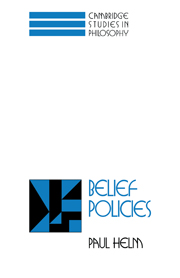Book contents
6 - Belief, weakness of will and self-deception
Published online by Cambridge University Press: 22 August 2009
Summary
It is necessary, at the outset, to distinguish between a cognitivist account of weakness of will, and weakness of will as applied to human cognitive activities. A cognitivist account of weakness of will would account for the phenomenon purely in terms of a conflict between beliefs or judgements. Whether it is plausible to account for weakness of will in such terms is not clear. In this chapter an attempt is made to confirm a significant parallel between action and the implementing of belief-policies by establishing the significant part played in the success or failure of implementation by weakness of will, whatever the correct account of weakness of will turns out to be.
In contemporary discussion, and from time immemorial, weakness of will has been discussed in connection with certain types of failure to act. The classical debate, as initiated by Plato, was the problem of how we could fail to act in accordance with what we know to be in our best interests. How can a person knowingly pursue evil as evil? How can we fail to do (ceteris paribus) what we know to be right? In contemporary debate, much of it initiated by the position taken up by R. M. Hare in Freedom and Reason (Hare, 1963), the issue (at least for Hare) is how a person can sincerely assent to the moral injunction ‘I ought to do X' and not do X.
- Type
- Chapter
- Information
- Belief Policies , pp. 142 - 163Publisher: Cambridge University PressPrint publication year: 1994



